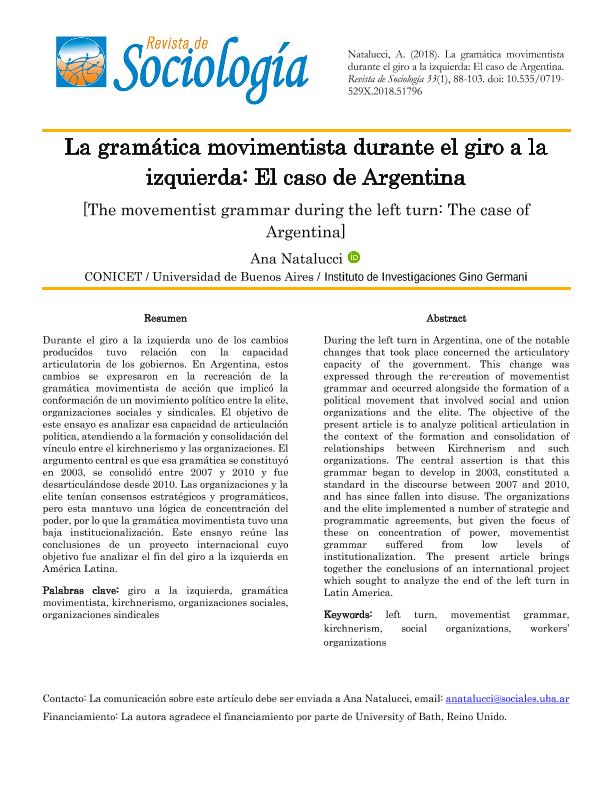Mostrar el registro sencillo del ítem
dc.contributor.author
Natalucci, Ana Laura

dc.date.available
2020-04-30T15:42:11Z
dc.date.issued
2018-12
dc.identifier.citation
Natalucci, Ana Laura; La gramática movimentista durante el giro a la izquierda: El caso de Argentina; Universidad de Chile. Facultad de Ciencias Sociales. Departamento de Sociología; Revista de Sociologia; 1; 33; 12-2018; 88-103
dc.identifier.issn
0719-529X
dc.identifier.uri
http://hdl.handle.net/11336/103998
dc.description.abstract
Durante el giro a la izquierda uno de los cambios producidos tuvo relación con la capacidad articulatoria de los gobiernos. En Argentina, estos cambios se expresaron en la recreación de la gramática movimentista de acción que implicó la conformación de un movimiento político entre la elite, organizaciones sociales y sindicales. El objetivo de este ensayo es analizar esa capacidad de articulación política, atendiendo a la formación y consolidación del vínculo entre el Kirchnerismo y las organizaciones. El argumento central es que esa gramática se constituyó en 2003, se consolidó entre 2007 y 2010 y fue desarticulándose desde 2010. Las organizaciones y la elite tenían consensos estratégicos y programáticos, pero esta mantuvo una lógica de concentración del poder por lo que la gramática movimentista tuvo una baja institucionalización. Este ensayo reúne las conclusiones de un proyecto internacional cuyo objetivo fue analizar el fin del giro a la izquierda en América Latina.
dc.description.abstract
During the left turn in Argentina, one of the notable changes that took place concerned the articulatory capacity of the government. This change was expressed through the re-creation of movementist grammar and occurred alongside the formation of a political movement that involved social and union organizations and the elite. The objective of the present article is to analyze political articulation in the context of the formation and consolidation of relationships between Kirchnerism and such organizations. The central assertion is that this grammar began to develop in 2003, constituted a standard in the discourse between 2007 and 2010, and has since fallen into disuse. The organizations and the elite implemented a number of strategic and programmatic agreements, but given the focus of these on concentration of power, movementist grammar suffered from low levels of institutionalization. The present article brings together the conclusions of an international project which sought to analyze the end of the left turn in Latin America.
dc.format
application/pdf
dc.language.iso
spa
dc.publisher
Universidad de Chile. Facultad de Ciencias Sociales. Departamento de Sociología
dc.rights
info:eu-repo/semantics/openAccess
dc.rights.uri
https://creativecommons.org/licenses/by-nc-sa/2.5/ar/
dc.subject
GIRO A LA IZQUIERDA
dc.subject
GRAMATICA MOVIMENTISTA
dc.subject
KIRCHNERISMO
dc.subject
ORGANIZACIONES SOCIALES
dc.subject
ORGANIZACIONES SINDICALISTAS
dc.subject.classification
Otras Sociología

dc.subject.classification
Sociología

dc.subject.classification
CIENCIAS SOCIALES

dc.title
La gramática movimentista durante el giro a la izquierda: El caso de Argentina
dc.title
The movementist grammar during the left turn: The case of Argentina
dc.type
info:eu-repo/semantics/article
dc.type
info:ar-repo/semantics/artículo
dc.type
info:eu-repo/semantics/publishedVersion
dc.date.updated
2020-04-15T20:39:39Z
dc.journal.volume
1
dc.journal.number
33
dc.journal.pagination
88-103
dc.journal.pais
Chile

dc.journal.ciudad
Santiago de Chile
dc.description.fil
Fil: Natalucci, Ana Laura. Consejo Nacional de Investigaciones Científicas y Técnicas; Argentina. Universidad de Buenos Aires. Facultad de Ciencias Sociales. Instituto de Investigaciones "Gino Germani"; Argentina
dc.journal.title
Revista de Sociologia
dc.relation.alternativeid
info:eu-repo/semantics/altIdentifier/url/https://revistadesociologia.uchile.cl/index.php/RDS/article/view/51796
dc.relation.alternativeid
info:eu-repo/semantics/altIdentifier/doi/http://dx.doi.org/10.5354/0719-529X.2018.51796
Archivos asociados
